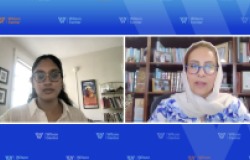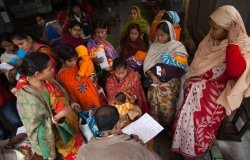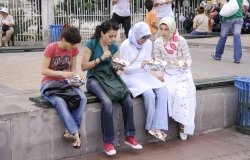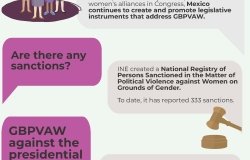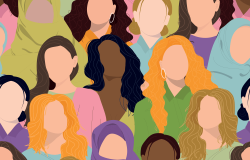Women's Economic Empowerment & Reproductive Health
As more organizations in the international development community commit themselves to supporting women’s empowerment, it has grown increasingly difficult to evaluate what that really entails.
Overview
As more organizations in the international development community commit themselves to supporting women’s empowerment, it has grown increasingly difficult to evaluate what that really entails.
“Everyone uses the word ‘empowerment,’” said the UN Foundation’s Alaka Basu at the Wilson Center on October 10. “It’s now such an overused word. You are empowered if you have a choice of 10 different shampoos in the grocery store; you are empowered if you have 100 kinds of cereals to buy; you are empowered by virtually anyone wanting to sell you something.”
Basu argues in her research that effective gender equality initiatives need to go “beyond that way of looking at empowerment and ask, ‘what is meaningful empowerment?’”
She was joined by Wendy Baldwin, formerly of the Population Reference Bureau, for a discussion about the effectiveness of the international development community’s efforts to empower some of the world’s most marginalized women.
Is Increasing Choices Enough?
“If we are to assume empowerment automatically means gender equality, women’s rights, women’s strength – I think that’s a misnomer,” Basu said. “Empowerment in the…sense of just expansion of choices can occur in many ways which do not touch the patriarchy, which do not touch women’s status, and therefore to assume women are empowered…[and] ideologies have changed, doesn’t make sense.”
Basu said these “instrumental” empowerment initiatives are problematic because it is hard to determine whether or not providing new choices actually changes attitudes about gender roles and rights, even if they increase practical opportunities.
“How does expansion of women’s choices lead to outcomes in other fields?” she asked. It’s not clear it does, in some cases. “Data [in some countries] shows that women who are working are very good at achieving many kinds of gross reproductive health outcomes, but when you look at their attitudes…the majority of them still think it’s justified for a man to beat his wife…if she doesn’t produce a hot meal, or if she refuses sex, or if she talks to strangers,” she said.
When it comes to quantifying progress in empowerment efforts, there has been too much exclusive reliance on hard data, such as employment and health statistics, Basu continued. For example, lower rates of sexually transmitted infections can be misleading in places where women simply aren’t allowed to have sex. In addition to quantitative data, there is a need to include additional information about changing attitudes.
What Is Successful Empowerment?
Baldwin applauded Basu’s message about expanding the traditional approach to empowerment, urging organizations to “unpack the concepts” behind their goals to determine what they define as successful empowerment.
The idea of women’s empowerment is not clearly defined. For example, organizations should ask themselves when they start employment initiatives whether they are addressing working in the house or out of the house, in the formal sector or the informal sector, Baldwin said. “What is it about having that job or that income that makes a difference when [women] come home?” For organizations making these decisions, “it would be extra helpful to actually understand how these concepts knit together so that you would have half a chance that pushing on this part of the concept is actually going to give you the effect at the other end that you want,” she said.
In Basu’s eyes, empowerment is best defined as an expansion of agency throughout women’s lives, not in individual sectors. “We mean expansion of choice according to [women’s] rules,” she said. “Even ‘bad’ behaviors can be an outcome of expanded choice.”
“It’s not just that with increased choice you can choose to do something or have something, but you’re also able to…choose something that goes against the norm,” agreed Baldwin. She pointed out, for example, the idea of finding better husbands doesn’t fit into the traditional empowerment narrative, and, in fact, runs counter to it in some ways. But by finding ways to encourage women to stay with men who do not abuse them and respect their rights, it is possible to foster attitudes of empowerment that go beyond economic opportunities. Such decisions help build empowerment beyond individual needs and create lasting change for multiple generations.
Baldwin said NGOs and governments working on women’s empowerment should plan their efforts with consideration for the source of empowerment. Are they merely adding additional options, or truly enabling women to choose for themselves? Without careful consideration of the difference, she suggested gender equality initiatives might struggle to find the results they aim for.
“Life Is Not a Randomly Controlled Experiment”
“Ideological change really requires you to question the patriarchy,” said Basu, “and here it appears a lot of these so-called empowering factors aren’t quite as effective as we think they are.” This does not mean there is no place for economic empowerment initiatives, she argued, but rather there ought to be greater consideration regarding their implementation.
For Baldwin, achieving better results from empowerment efforts around the world begins with self-scrutiny in the international development community. She advocated for a “mixed method” approach to evaluation that combines the usual survey data with qualitative research. “If we could structure our research to go back…and say ‘I didn’t ask you the right questions, can I ask you more?’” then we could reduce misinterpretations of purely statistical data, she said.
Basu believes that empowerment must be considered from all angles, not just in terms of commodities and economic choices: “Life is not a randomly controlled experiment – we need to have a storyline that links all of these issues.”
Basu’s research, still in progress, will be included in an upcoming white paper from the UN Foundation.
Event Resources:
Drafted by Donald Borenstein, edited by Schuyler Null.
Speakers
Hosted By

Environmental Change and Security Program
The Environmental Change and Security Program (ECSP) explores the connections between environmental change, health, and population dynamics and their links to conflict, human insecurity, and foreign policy. Read more

Global Risk and Resilience Program
The Global Risk and Resilience Program (GRRP) seeks to support the development of inclusive, resilient networks in local communities facing global change. By providing a platform for sharing lessons, mapping knowledge, and linking people and ideas, GRRP and its affiliated programs empower policymakers, practitioners, and community members to participate in the global dialogue on sustainability and resilience. Empowered communities are better able to develop flexible, diverse, and equitable networks of resilience that can improve their health, preserve their natural resources, and build peace between people in a changing world. Read more
Thank you for your interest in this event. Please send any feedback or questions to our Events staff.
